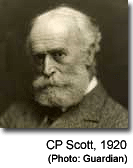September 18, 2005
The More Things Change ...
 You've heard me say that journalism is a verb, meaning that journalism is something we do, a way of communicating information, context and conversation that is distinct from the platforms we use to communicate with.
You've heard me say that journalism is a verb, meaning that journalism is something we do, a way of communicating information, context and conversation that is distinct from the platforms we use to communicate with.
I came across this essay by CP Scott, the legendary editor of the Guardian, written on the occasion of that newspaper's 100th anniversary. Scott wrote this in 1921, decades before newspapers began falling victim to the emergence first of television and, more decades later, digital media. Scott warns of a much greater danger to the future of newspapers -- which at the time were the only commerical vehicle for journalism -- media consolidation, loss of personality and soul and a public that will reject chicanery and arrogance. Scott wrote(my emphasis):
One of the virtues, perhaps almost the chief virtue, of a newspaper is its independence. Whatever its position or character, at least it should have a soul of its own. But the tendency of newspapers, as of other businesses, in these days is towards amalgamation. In proportion, as the function of a newspaper has developed and its organisation expanded, so have its costs increased. The smaller newspapers have had a hard struggle; many of them have disappeared. In their place we have great organisations controlling a whole series of publications of various kinds and even of differing or opposing politics. The process may be inevitable, but clearly there are drawbacks. As organisation grows personality may tend to disappear. It is much to control one newspaper well; it is perhaps beyond the reach of any man, or any body of men, to control half a dozen with equal success. It is possible to exaggerate the danger, for the public is not undiscerning. It recognises the authentic voices of conscience and conviction when it finds them, and it has a shrewd intuition of what to accept and what to discount.
The essay's most oft-quoted sentence is this one: "Comment is free, but facts are sacred," which goes to the heart of an argument for a free and independent press. But, Scott's prescient observation about the public's tendency to gravitate toward authenticity dovetails nicely with the public's current disaffection with mainstream media (45 percent of Americans believe "little or almost nothing" of what they read in papers) and its growing dependence on independent voice like those of bloggers.
Posted by Tim Porter at September 18, 2005 06:15 PMBless CP Scott, but people are a lot dumber today. Anyone can fake authenticity, and a lot of people have and have been rewarded with great success.
Posted by: Lex on September 19, 2005 07:52 AM